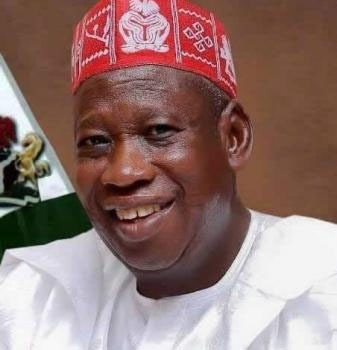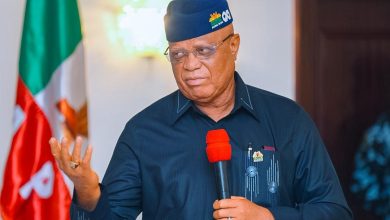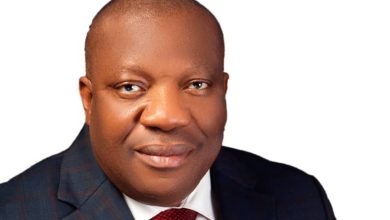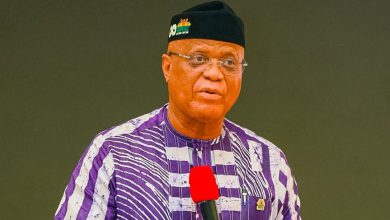
Nigerian governors are powerful to the hilt. They know how to wield power to their advantage almost in every situation no matter whose ox is gored.
With the yam and knife firmly in their hands, governors undoubtedly possess the power to do, undo and cut to size anybody or forces that tend to exhibit iconoclastic traits or dissent within their jurisdiction of influence. They don’t like people who seem to know too much and talk too much.
In Nigeria, if you are intellectually up there, know a thing or two, you earn a place in the good books of governors by keeping mute even in the face of a crying need to voice out against their anti-people policies and programmes, not to say undemocratic tendencies that throw to the dogs the spirit and substance of democracy.
But you incur the acidic wrath of our incredibly powerful governors when you speak out boldly against their missteps, wrong moves and failures. In fact, sometimes it is not the governor that will come at you with long knives, slings and cudgels, but his minions, hangers-on and henchmen whose livelihood, survival wholly depend on the governor on whose behalf they rant, rave and rage against anybody perceived to be an enemy of their boss or, better put, his government.
We live in a clime where most governors can’t stand criticism no matter how proverbially constructive it is. For some governors, rather than point out to them areas they should improve on, projects they shouldn’t embark on, policies they should pursue with unwavering vigour, they prefer to be praised all day long whether they are doing well or not. It is no wonder that praise-singers and cheerleaders get a look-in when appointments are dished out while those who know their onions, posses the intellectual rigour and vigour to contribute to development are overlooked because they are perceived to be too smart to be trusted with any position.
But in the long run, we are the ultimate losers because no nation or state makes any meaningful headway by discarding its best brains and choosing to embrace and employ charlatans who have little or nothing to offer in facilitating and accelerating the course of governance vis-à-vis development other than their giftedness in singing to high heavens empty canticles of panegyrics and sweet-nothings of governors, who, lost in the razzmatazz of those deluding moments, nod, chuckle and shuffle in sheer ecstasy.
This culture has no doubt kept many states and even our country in doldrums. We cannot have steady electricity in Nigeria because of the failure of leadership and inability to have the kind of followers that are ready to ask the right questions and queue behind the right set of leaders that mean well for them. Ours is a kind of followership that thrives on few cups of rice, torn naira notes and other cheap incentives that make the voters turn a blind eye to the right people they should vote for and choosing rather to follow the man who hands them goodies just so they act against their conscience. They sell their power to choose their leaders for a mess of pottage, smile for a moment and wail for another four years or more of deprivation and depressing squalor.
In a way, you cannot totally blame our long-suffering people because leaders deliberately starve them of good paying jobs that can lift them from the cesspool of poverty and hoist them to a place of satisfaction and comfort. They can’t have good roads all at once, no water, no basic utilities that make living worth the while just so that whenever election time comes, our ever sugar-coated tongued leaders will have something to campaign on to, as usual, cow a bewildered and hungry electorate who have no choice but to do the bidding of those who shower them with wads of raw cash, rice, salt and other insulting freebies on election days. When they win, “beware of ravenous dogs become the signage on their gates”, phone numbers change, the purse string is tightened, but as another election season draws near, they characteristically turn emergency philanthropists.
RELATED: Exposing Illegality of Ex-Governors Pension Law
We sincerely cannot progress as a people with this kind of culture. Leaders at all levels should come to terms with the fact that criticism is part and parcel of democracy. I dare say that criticism is the fuel that drives governance for it helps governors and other leaders to sit up, keep them on their toes and rouse them from lethargy to pragmatism thus yielding better and more appreciable results that make life better for the led.
This piece is inspired by the recent dethronement of the Emir of Kano, His Highness Alhaji Muhammadu Sanusi II the other day by the governor of the state, Dr Abdullahi Ganduje. It once again brought to the fore the enormous powers and influence that reside with governors.
The unhorsing of Emir Sanusi from the throne gives vent to what many have always held that most of our governors are too power-drunk. This accounts, to a reasonable degree, the fear nursed by many over the move to create state police. The fear is somewhat in order because of the way and manner some governors conduct themselves, how carried away they are with power and their propensity to visit fire and brimstone on anybody that opposes their philosophy and style of leadership.

The deposition of Mallam Lamido Sanusi, a former Central Bank Governor, has generated so much interest because, to any sane mind shone of hate for an intellectually sound society, his dethronement cannot be plausibly explained no matter who attempts it, nor can one advance any credible reason(s) to justify that display of crude tyranny and crass abuse of power that is at best transient and ultimately tenured.
Personally, I had reservations from the word go when Sanusi’s name was linked to the emirship stool in 2014. At any rate, I did not reckon the five-star economist as one cut out for the traditional seat. Seeing him in his trademark suit that often fitted into his petite frame snugly, I saw him exchanging that with the turban, paraphernalia and appurtenances of a royal robe, without any prejudice to that hallowed office, as a misnomer of sorts.
For me, Sanusi is tailor-made for the big league. His education, erudition and charisma transcend the cozy but limited walls of a traditional stool. He comes across more like a global figure than an ethnic champion ensconced in one traditional enclave and attired in big flowing garbs that stand in contradistinction with his well known smart suit that oozed with elegance and élan.
The reasons adduced by Kano State Government for the removal of Sanusi are lame and inexcusable. His dethronement had long been hatched because the man was not playing to the gallery, not a conformist, hence could not keep quiet or look the other way while things went amiss. He simply was too outspoken for the governor and government of Kano State. Sanusi saw evil and called it by its name. Having attained a remarkable level academically, Sanusi was depressed with the poor level of education of not particularly about those from Kano State but the entire North.
At every forum, Alhaji Sanusi spoke loudly and clearly against the rate of poverty in the North. He wanted a change, a reform, a turnaround and a departure from a culture that has kept the North in the backwaters of underdevelopment, poverty, avoidable deaths arising from poor health care and lack of education for the average son, daughter of the region. He was unsparing and spoke volubly, not to say daringly about the need for a paradigm shift in the leadership architecture of the North. But while he was saying the obvious and raising the right alarm, he was unwittingly drawing the ire of not just his governor but possibly other powerful northern forces who felt he was indicting them. So, for Sanusi, it was a matter of when rather than if he’ll get the boot.So, when it eventually came, there were less surprises because his ouster was always going to come given that his activism and frankness did not go down well with the staunch beliefs, ideology and philosophy of powerful elements in the North, especially that of Governor Ganduje who pulled all the stops to ensure Sanusi was shown the door.
Sanusi is no saint, but most of his messages and concerns were apt and in sync with reality. This was a man who did not want his people favoured for employment because of where they come from other than on the basis of competence and proficiency. He sought for equal rights for his people and not giving them postings as a way of compensation hence seeing them as sub-humans. To achieve this, he called for massive investment in education of northern children, because having experienced the importance of education, he wanted others to benefit for their psyche to be retooled and regenerated. But his governor apparently thought otherwise. He saw his boldness as an affront on him and his administration.
What has befallen Sanusi is not a good omen for the traditional institution in Nigeria because in one breath, it shows the disdain with which governors hold our once reverred traditional institution, and sends a discomforting message to other royal fathers to the effect that they must tread softly by not speaking truth to power, calling the bluff of governors when they go wrong or giving useful suggestions on how to improve and better the lots of the people.
Our monarchs must rise in unison to condemn the onslaught against them and the traditional institution. Keeping quiet does no one any good. An injury to one should be an injury to all, for, as the saying goes, injustice anywhere is a threat to justice everywhere. It may be Kano State today, who knows where this ill wind will blow again tomorrow?
Our governors should be liberal, accommodating and be open to criticism for that is what is needed in a democracy to keep them in check and in tune with the basic and most pressing needs of the people rather than see those, more so monarchs, who speak up as enemies that must be cut to size. The display of highfalutin hubris by governors is destructive and portends grave danger to the spirit and letters of democracy, not to talk of our traditional institutions.
Governors should know that they hold their position in trust for the people. They are no islands neither are they all-knowing, hence should exercise restraint in the way and manner they use the power at their disposal. The power saddled in their office by the law should be applied for good courses and not for victimisation and bullish arrogance.




